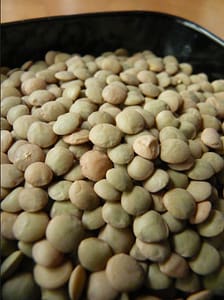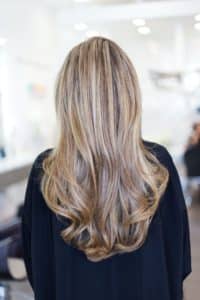Hair changes after 40 are important to understand because your hair is one of the first places people look to determine your age. Hair care after 40 can be a little more challenging than it was when you were younger, but with a few tricks, you can still look good and keep your hair healthy.
There are two ways to address how your hair ages. These are how it actually looks, and what is going on microscopically that cannot be seen (1).
Diet
With regard to the latter, one of the most important things to start with for an anti-aging hair care routine is a healthy diet. A balanced, nutrient dense diet is going to help your body fight off disease and promote growth in all areas of your body, including your hair.
Protein
 Foods high in protein, such as meat, eggs and fish, are necessary to promote the growth of stronger, thicker hair (2). If you are not a meat eater, you can get protein from beans, lentils, nuts and quinoa.
Foods high in protein, such as meat, eggs and fish, are necessary to promote the growth of stronger, thicker hair (2). If you are not a meat eater, you can get protein from beans, lentils, nuts and quinoa.
The specific protein that makes up hair is keratin. For this reason, there are shampoos and conditioners that contain this nutrient. Using these products regularly is a good idea to keep your hair at optimum health and prevent hair loss. Alternatively, you can use special keratin treatments to smooth the hair every now and then (3). However, do not use them too often as they have been reported to have higher than recommended levels of formaldehyde (4), which at best can cause irritation and at worst can lead to cancer (5).
To support the production of keratin to grow healthy hair, biotin (also known as vitamin B7) is necessary (6). The best foods to eat to get enough biotin and keep your hair healthy are liver, kidney, salmon, eggs, almonds and sweet potatoes (7).
Omega 3

Zinc
A deficiency in zinc has been shown to cause hair loss as well as thinning hair (9), so make sure you are getting good sources of zinc like lean meat and seafood, especially liver and oysters. Vegetarian sources are almonds and chickpeas (10).
Hair Loss

Hair loss can also be caused by a build-up of toxins in the body from smoking (14) and air pollution (15).
For that reason, one of the best things that you can do to prevent hair loss, which makes you look older and is also distressing, is to stop smoking. This will also benefit your health in other ways. If you live or work in the city, it is hard to get away from pollution. However, in order to prevent toxic substances in pollution from being absorbed into your hair, cover your hair with a headscarf or hat, if possible, and wash it daily with warm (not hot) water and a mild shampoo.
Avoid Heat Damage

If, however, you cannot wait or you want to style your hair, keep the hairdryer moving and 15 cm or more away from your hair to reduce the amount of damage to your hair (16).
It is important to wash your hair gently and use a moisturizing shampoo and conditioner that doesn’t contain sulfates to prevent further drying of your hair (17).
Color
As we age and go grey, we tend to use dyes to keep our natural color as long as possible. However, it is best to avoid harsh dyes and chemicals if you can. Many of the things put into dyes, shampoos, and other hair care products are harsh chemicals that strip away your natural oils or damage your hair. It is important to find safe alternatives that will keep your scalp healthy.
When it comes to hair coloring, there are plenty of options for people over 40. You can go with a lighter shade, such as a highlights or lowlights, or you can go with a more drastic change and dye your whole head a new color.
If you’re considering hair coloring, it’s important to keep your skin tone in mind. Lighter shades will look better on people with cooler skin tones, while warmer shades will look better on people with warmer skin tones. If you’re not sure what your skin tone is, ask your stylist for advice.
Whatever color you choose, make sure to use a quality hair color that is made specifically for people over 40. These colors are less harsh on the hair and will give you better results.
Hair Masks

For long and medium length hair: Mix together the flesh of half a ripe avocado, 1 egg, 50g of coconut oil and 10-15 drops of geranium essential oil. (Use half this recipe if you have short hair). Apply it to wet hair and cover (an old shower cap is ideal). Leave it for about 20 minutes. Rinse your hair with cool water. Do not use hot water or you will cook the egg! Then wash with a mild shampoo and condition.
Rose geranium essential oil is used in this recipe as it is great for hair growth because it nourishes and stimulates the scalp. This oil can also be used as a base for home-made conditioners and even hairspray (18).
Thinning Hair

Be sure to wear a hat when you are in the sun to protect your hair from the drying and damaging effects of UV rays. You may feel slightly daft, but for more protection, especially in the mid-day sun, use a parasol or even an umbrella (21).
Going Forward with Your Hair Care Program
As discussed, hair can have a huge impact on how old you look. It is worth looking after your crowning glory because, after all, the better you look, the better you feel and the younger you will look and feel.
Our article provided an overview of hair changes over 40, and what how to counter them through management and diet. There also are a boatload of hair care products designed for people over 40 that you can check out.
Although you can’t stop the hands of time, there are plenty of ways to turn back the clock.
References
- A Comment on the Science of Hair Aging https://www.ncbi.nlm.nih.gov/pmc/articles/PMC6369639/
- Effects of different dietary protein levels and DL-methionine supplementation on hair growth and pelt quality in mink (Neovision vision) https://pubmed.ncbi.nlm.nih.gov/23020079/
- Feather keratin hydrolysates obtained from microbial keratinases: effect on hair fiber https://www.ncbi.nlm.nih.gov/pmc/articles/PMC3621039/
- Characterization of Formaldehyde Exposure Resulting from the Use of Four Professional Hair Straightening Products https://www.tandfonline.com/doi/abs/10.1080/15459624.2011.626259
- Facts About Formaldehyde https://www.epa.gov/formaldehyde/facts-about-formaldehyde
- Biotin and biotinidase deficiency https://pubmed.ncbi.nlm.nih.gov/19727438/
- Biotin https://ods.od.nih.gov/factsheets/Biotin-HealthProfessional/
- Effect of a nutritional supplement on hair loss in women https://pubmed.ncbi.nlm.nih.gov/25573272/
- Zinc: An Essential Micronutrient https://www.ncbi.nlm.nih.gov/pmc/articles/PMC2820120/
- Zinc https://ods.od.nih.gov/factsheets/Zinc-HealthProfessional/
- How real is senescent alopecia? A histopathologic approach https://pubmed.ncbi.nlm.nih.gov/21146732/
- Androgenic Alopecia Is Associated with Less Dietary Soy, Higher Blood Vanadium and rs1160312 1 Polymorphism in Taiwanese Communities https://journals.plos.org/plosone/article?id=10.1371/journal.pone.0079789
- Soybeans and soy foods https://www.betterhealth.vic.gov.au/health/healthyliving/soybeans
- Association of Androgenetic Alopecia With Smoking and Its Prevalence Among Asian Men https://jamanetwork.com/journals/jamadermatology/fullarticle/654456
- Level and Relationship of Elements in Scalp Hair of Males: Effect of Air Pollution and Smoking Habits https://ruj.uj.edu.pl/xmlui/bitstream/handle/item/255371/grybos_et-al_level_and_relationship_of_elements_in_scalp_hair_of_males_2005.pdf?sequence=1&isAllowed=y
- Hair Shaft Damage from Heat and Drying Time of Hair Dryer https://www.ncbi.nlm.nih.gov/pmc/articles/PMC3229938/
- Are sulfates in shampoo dangerous? https://www.medicalnewstoday.com/articles/327013
- Get Goddess-like hair with rose geranium essential oil https://ecodrop.co.uk/repair-your-hair-with-geranium-essential-oil/
- The Best Haircuts for Thin Hair https://www.purewow.com/beauty/The-Best-Haircuts-for-Thin-Hair Another
- Age, Health and Attractiveness Perception of Virtual (Rendered) Human Hair https://www.ncbi.nlm.nih.gov/pmc/articles/PMC5177627/
- Best Ways to Protect Your Hair From Sun Damage https://health.clevelandclinic.org/best-ways-to-protect-your-hair-from-sun-damage/

